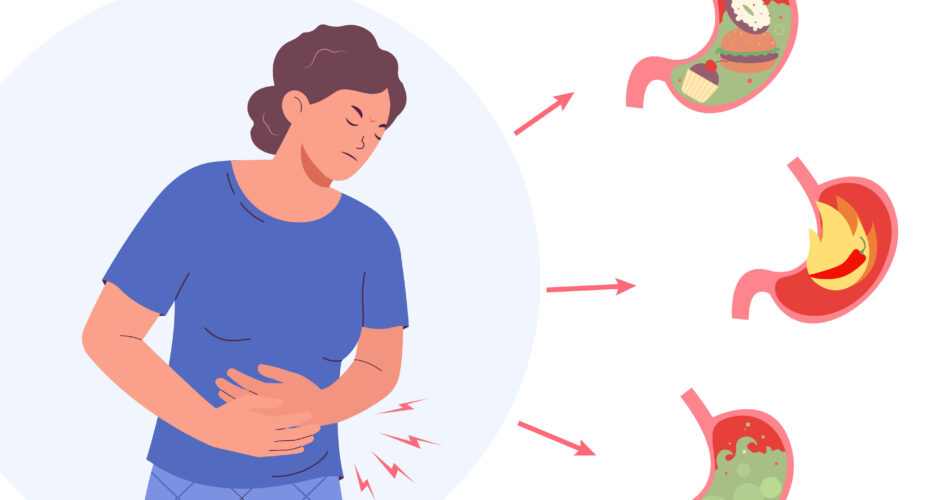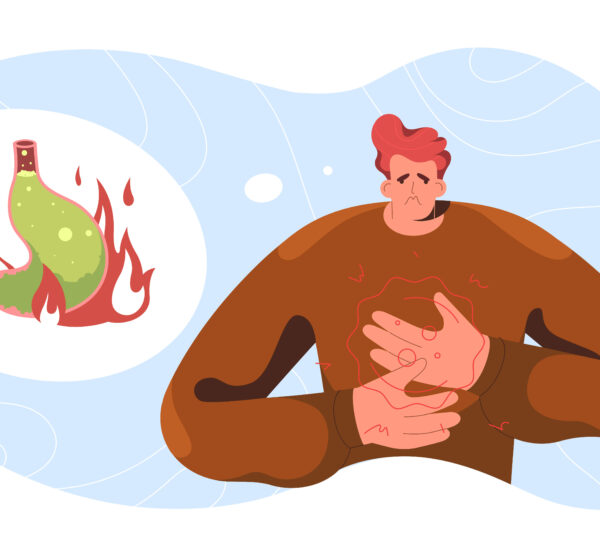Suffering from severe acid reflux or gastroesophageal reflux disease (GERD) can have a significant impact on your overall health. The constant rising of stomach acid, bile, and other substances can result in serious complications. That’s why knowing the GERD causes is crucial to prevent these conditions. Understanding how people commonly develop this condition can enlighten you to be more proactive about your health. Thus, ensuring the prevention of this gastroenterology disease.
In this article, we’ll unlock the different GERD causes. Some of these causes are simple actions people disregard but may have a significant impact on one’s digestive process. Whether or not you are guilty of these causes, it’s ideal to recognize these mistakes and correct them. Let’s begin!
What is GERD?

GERD is a chronic condition that occurs when the ring of muscle called lower esophageal sphincter (LES) weakens or relaxes abnormally. This scenario can result in the stomach contents like stomach acid flowing back into the esophagus. This backward flow, known as acid reflux, can cause irritation and inflammation of the esophageal lining.
When the acid goes up, it affects the tissues, leading to the scarring of tissues and narrowing of the lining of the esophagus. It results in inflammation and growth of abnormal tissues, and the occurrence of GERD symptoms.
It is important to note that GERD is a common condition, affecting people of all ages. While occasional acid reflux is normal, experiencing frequent acid reflux could indicate a problem. Seeking medical advice and proper diagnosis is crucial in managing this condition effectively.
Symptoms and Complications of GERD
The symptoms of GERD can vary from individual to individual. However, there are certain symptoms that people commonly experience.
These symptoms include the following:
- heartburn or chest pain
- regurgitation
- nausea
- burning feeling
- vomiting
- sour taste
- difficulty in swallowing
If these symptoms continue to progress, serious complications can occur. Some of the conditions are as follows:
- chronic cough
- esophagitis
- high blood pressure or hypertension
- asthma
- esophageal stricture
- Barrett’s esophagus
- esophageal cancer
- dental issues
- heart attack
It is essential for individuals experiencing persistent acid reflux GERD symptoms to undergo regular monitoring and screenings to detect any potential complications early. Treatment options range from lifestyle modifications and dietary changes to medications and, in severe cases, surgical interventions. Working closely with healthcare providers can help individuals effectively manage GERD and improve their quality of life.
GERD Causes
Understanding the possible health complications is one thing, but learning the possible GERD causes is a whole other aspect that you should prioritize. GERD causes vary from the actions you do in your daily activities to external factors such as medications and more. With the different contributing factors surrounding you, it can be daunting to take a step as any wrong action can lead to the development of GERD.
In that case, it is best to recognize the different GERD causes to assess yourself and to make some changes in the future. That can include your lifestyle choices and other significant factors that can contribute to GERD. Let’s discuss these GERD causes below!
A. Foods That Trigger GERD

Diet plays a crucial role in the development and management of GERD. Certain foods can trigger or worsen GERD symptoms, while others can help alleviate them. Individuals with GERD need to identify their trigger foods and avoid or limit their consumption.
Some common foods that are known to be GERD causes:
- spicy foods
- acidic foods and beverages (such as citrus fruits and juices, tomato-based products, and coffee),
- fatty foods
- chocolate
- carbonated beverages
While all of these GERD causes can have an impact on one’s digestive system, some of them are more likely to produce that outcome. For instance, spicy foods can irritate the esophagus and lead to increased acid production in the stomach, worsening GERD symptoms. Similarly, fatty and fried foods can relax the lower esophageal sphincter (LES), allowing stomach acid to flow back up into the esophagus more easily.
Understanding the impact of diet on GERD can empower individuals to make informed dietary choices to manage their condition effectively.
B. Overeating and late-night meals
In addition to specific trigger foods, GERD causes can also involve overeating and consuming large meals close to bedtime. The stomach becomes distended when overfilled, increasing the pressure on the LES and promoting acid reflux. Eating smaller, more frequent meals and allowing a few hours to pass after eating before lying down can help alleviate symptoms.
Moreover, GERD causes like late-night meals can disrupt the body’s natural digestive process, as lying down shortly after eating can make it easier for stomach acid to flow back into the esophagus. This can lead to discomfort and disrupted sleep, impacting the overall quality of life for individuals with GERD.

C. Lifestyle Factors Contributing to GERD
Meanwhile, lifestyle choices are also some of the known GERD causes. Identifying and addressing these factors can significantly improve the management of GERD symptoms.
Smoking and alcohol consumption have been linked to an increased risk of GERD. Smoking weakens the LES and impairs the normal function of the esophagus, while alcohol can relax the LES and increase stomach acid production. Quitting smoking and reducing alcohol intake can have a positive impact on GERD symptoms.
Furthermore, a sedentary lifestyle can lead to obesity, which is one of the known GERD causes. When you choose to pursue this kind of lifestyle, your body tends to build up more fat. This increase in weight brings pressure to the abdomen, which results in the rise of acid or GERD.
D. High Stress Levels and GERD
Stress has long been recognized as a mental health factor contributing factor to various health conditions, including GERD. Chronic stress can affect the body’s digestive system, leading to increased stomach acid production and relaxation of the LES. Managing stress through techniques like relaxation exercises, meditation, and counseling can help reduce GERD symptoms.

E. Medical Conditions Relation with GERD
Aside from poor lifestyle choices, other conditions are also recognized as one of the GERD causes. Conditions like hiatal hernia occur when a portion of the stomach protrudes through the diaphragm into the chest cavity. This anatomical abnormality can weaken the LES, leading to acid reflux and GERD symptoms. Treating the underlying hiatal hernia can improve GERD symptoms in some cases.
Furthermore, there are certain genetic disorders, such as Ehlers-Danlos syndrome, that have been associated with an increased risk of GERD. These disorders affect the connective tissue, including the muscles of the esophagus and LES, leading to a higher susceptibility to acid reflux and GERD symptoms.
Additionally, patients with kidney diseases are also suspected to be prone to develop GERD. However, some researchers claim that there’s no clear connection yet. That’s why it is ideal to undergo a health check-up whenever a health problem like GERD arises.
F. Medications That Can Cause GERD
It’s important to note that certain medications can trigger or worsen GERD symptoms. Being aware of these medications can help individuals make informed decisions about their treatment options.
Some over-the-counter medications, such as nonsteroidal anti-inflammatory drugs (NSAIDs) like aspirin and ibuprofen, can irritate the digestive system and increase the risk of GERD symptoms. In addition to NSAIDs, certain over-the-counter pain relievers and cold medications containing ingredients like acetaminophen or pseudoephedrine may also contribute to GERD symptoms.
Meanwhile, certain prescription medications can relax the LES or irritate the esophageal lining, leading to GERD symptoms. These medications are as follows:
- calcium channel blockers
- antihistamines
- sedatives
- tricyclic antidepressants
It is crucial to discuss any concerns about GERD symptoms with a healthcare provider who can evaluate the medication’s potential impact. At the same time, try to read the labels carefully and be aware of the potential side effects of these medications on gastrointestinal health.
G. The Role of Genetics in GERD
Moreover, genetics is also a crucial aspect to consider when it comes to GERD causes. While genetic factors alone may not cause GERD, certain inherited traits and genetic disorders can make individuals more susceptible to developing this condition.
Some inherited traits, such as a weak LES or abnormal esophageal contractions, can contribute to the development of GERD. That means, the genetic variations that influence the function of the lower esophageal sphincter (LES) can impact its ability to prevent stomach acid from flowing back into the esophagus. This malfunction can lead to frequent episodes of acid reflux, a hallmark symptom of GERD.
When to Seek Medical Help for GERD

Dealing with the risk factors for GERD can be exhausting, especially if it involves your common behaviors or actions. That means a huge change in your life must happen to improve your health. However, that’s not the only way to address GERD. Trusting the expertise of a healthcare provider gives you a better chance, especially since persistent acid reflux can lead to severe complications.
During the check-up, the doctor will ask for your medical history, assess your symptoms, and recommend a few tests. These steps allow them to curate a suitable medical treatment based on your condition.
The treatment plan will depend on your current condition, which means the prescribed medicine can be different from other GERD patients. However, the general type of medication that you’ll receive may involve antacids to address the chronic acid reflux or your GERD. Furthermore, you might receive a recommendation to visit a nutritionist to manage your diet and nutrition.
Conclusion
Understanding the common GERD causes is vital for its prevention and management. By being aware of the various factors that contribute to GERD, individuals can make informed choices regarding their diet, lifestyle, and treatment options. Remember, if you experience persistent or severe GERD symptoms, it is important to consult with a healthcare professional for proper evaluation and guidance.
Book an online consultation with a gastroenterologist today!


